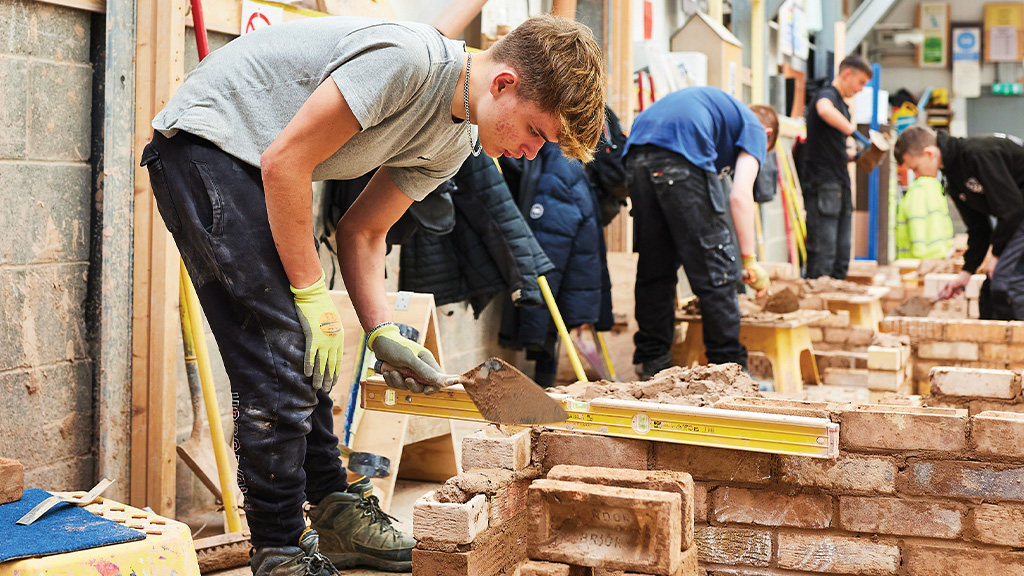Course Overview
This Craft Bricklaying Apprenticeship is available to anyone aged 18 years or over, who is employed within the industry, successfully completed the apprenticeship standard in bricklaying and is developing skills further to incorporate planning and organising work for both them and others, to support current work duties or duties in the future.
These will include carrying out bricklaying to complex walls and features such as chimneys, battered angles, redials and decorative masonry work; professionally interacting with their immediate team and the site management team or client on smaller projects; liaising with other trades: sometimes utilising modern methods of construction and premanufactured elements to construct.
An employee in this occupation will be responsible for creating a high-quality product which meets standards, specifications, and design plans. They are expected to do this with due regard to all safety aspects involved with working on a construction site, ensuring the health, safety and wellbeing of themselves and others always. With sustainable construction at the forefront of all projects, it is expected they would consider the environment and sustainability of materials, waste awareness and recycling.
Successful completion of this course leads to qualified craft bricklayer status.
This apprenticeship programme includes learning that relates to the following UN Sustainable Development Goals.
- Goal 4: Quality education
- Goal 8: Decent work and economic growth
- Goal 11: Sustainable cities and communities
What You Will Study
The aim of this apprenticeship study is to develop the knowledge, skills and behaviours required to work successfully as a craft bricklayer in a sector working towards Net Zero.
Our programme of study is sequenced to address resilience and wellbeing at the start of the programme through a one-day programme leading to formal certification upon successful completion.
The knowledge and skills around feature bricklaying and heritage bricklaying are developed which supports skills used in the workplace.Planning and organising, methods of communication, modern methods of construction and digital technologies skills are all developed.
Whilst there is no mandatory on-programme assessment of this element of the programme, it is possible to achieve a Level 2 Award in Retrofit to demonstrate attainment and a Level 3 award in BIM
- Attendance Expectations
Attendance at college is expected to be 10 months on a block week release basis (Monday to Friday from 09:00am to 05:30pm). The typical college day is 50% classroom based and 50% workshop based.
- How You Will Be Assessed
To supplement development as a craft bricklayer in the work place you will attend college to learn through tutor led classroom and workshop sessions. This in college learning will be supported with Microsoft Teams, providing access to college resources and a channel for communication when not in college.
In the workplace, where you will be required to maintain a record of workplace activity alongside a portfolio of skills development you and your employer will be supported by both a college reviewer and a college assessor. Throughout the training period both college lecturers/assessors and your employer representative will complete progress reviews. When both your employer and the college consider you competent in all the knowledge, skills and behaviours you will be entered in for the End Point Assessment.
This is a three-part independent assessment:
- Knowledge assessment, a multiple-choice exam
- Skills assessment -simulated practical tasks
- Oral assessment, professional discussion around your portfolio produced from the workplace
Successful assessments are graded pass/merit/distinction.
- Entry Requirements
Successful completion of the Level 2 Bricklayer Apprenticeship/Level 2 NVQ Diploma in Bricklaying.
AND
GCSE Grades 9-4, including English and Maths.
You will be required to take an initial skills assessment.
However, following overall consideration of the skills required by this standard, entry requirements will be determined by the employer.
Apprentices without Level 2 English and Maths will need to achieve this level prior to taking the End-Point Assessment. For those with an education, health and care plan or a legacy statement, the apprenticeship’s English and Maths minimum requirement is Entry Level 3.
A British Sign Language (BSL) qualification is an alternative to the English qualification for those whose primary language is BSL.
- Further Study
Progression to the Level 4 Apprenticeship for Construction Site Supervisor is also available at Castleford College.
